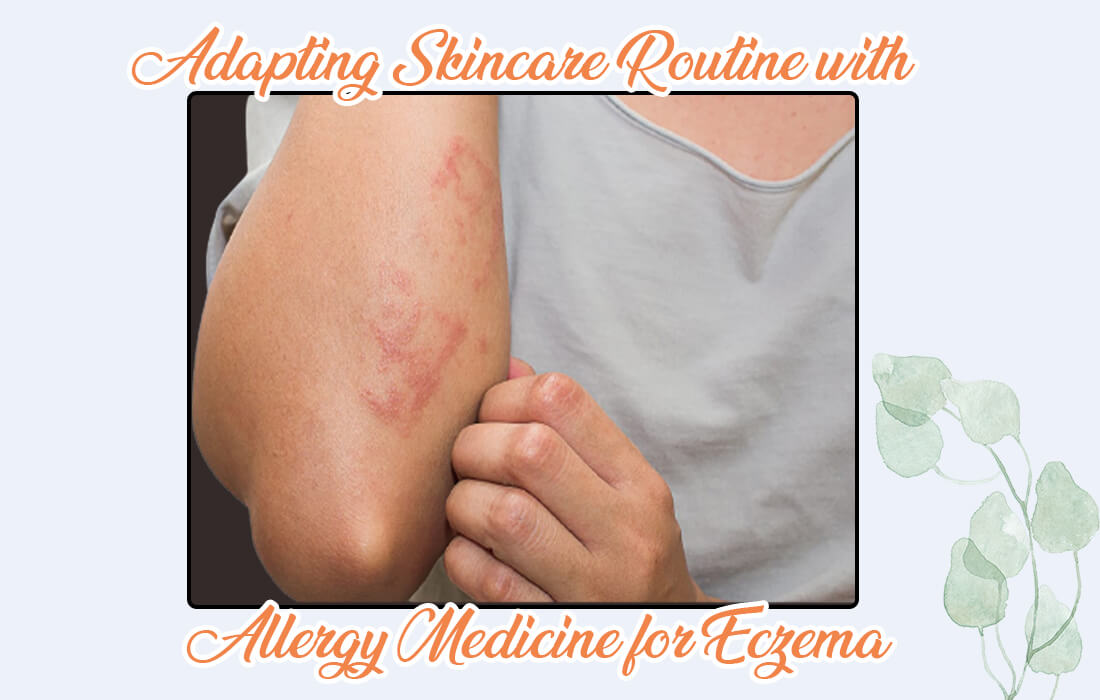Eczema may be a complex skin condition, but adhering to an effective skincare regimen can bring relief and comfort. In this guide, we’ll share simple and effective tips to adapt to your eczema skincare routine, including using allergy medicine for eczema so you can significantly improve your comfort and relief. Say goodbye to itchiness and discomfort, and hello to healthier, happier skin!
Understanding Eczema
Eczema, recognized as atopic dermatitis, manifests as a persistent skin issue with symptoms of dryness, itching, and skin inflammation. It often appears in patches and can be quite uncomfortable. Managing eczema involves a combination of skincare practices with necessary eczema itching medicine.
Here are some key strategies to adapt your skincare routine effectively.
1. Cleansing:
- The first step in adapting your skincare routine for eczema is gentle cleansing. Avoid harsh soaps or fragrance cleansers, as they can worsen eczema symptoms. Opt for a mild, fragrance-free cleanser and use lukewarm water.
- After washing, use a gentle patting motion with a soft towel to dry your skin; refrain from rubbing, which could worsen skin irritation.
- Cleansing should be done twice daily to remove impurities without stripping your skin’s natural moisture.
2. Gentle Shower:
- While warm showers may provide relaxation, hot water can deplete your skin’s natural oils and exacerbate eczema. Keep your showers short and use lukewarm water instead of hot.
- Following your shower, gently pat your skin to retain moisture, leaving it slightly damp. Apply moisturizer right away to seal in the hydration.
3. Hydration is key:
- Eczema-prone skin tends to be dry and sensitive. To combat this, make hydration a priority.
- Choose a thick, fragrance-free moisturizer with ingredients like ceramides or hyaluronic acid. Apply it generously after cleansing and throughout the day as needed.
- This locks in moisture and forms a protective barrier, preventing water loss from your skin.
- Daily skin hydration can help reduce the itchiness and flakiness commonly associated with eczema.
4. Avoid Irritants:
- Steer clear of skincare products containing potential irritants such as alcohol, retinoids, and alpha-hydroxy acids. These can exacerbate eczema symptoms.
- Always check product labels and opt for hypoallergenic, fragrance-free options. Patch-testing new products is a smart practice to ensure they don’t trigger a flare-up.
5. Sun Protection:
- Eczema-prone skin is often more sensitive to the sun’s harmful rays. Sunburn can worsen your eczema, so wear sunscreen with an SPF of at least 30 for comprehensive protection while stepping outside.
- Opt for sunscreens designed for sensitive skin, and make sure to reapply them every two hours. Moreover, use protective attire, such as long-sleeved clothing and broad-brimmed hats, to safeguard your skin from sunlight.
6. Stress Management:
- Stress is known to trigger eczema flare-ups. Integrate stress-reduction methods like deep breathing, meditation, or yoga into your daily schedule.
- Finding ways to relax not only benefits your mental well-being but can also help keep your eczema in check.
Conclusion:
Adapting your skincare routine for eczema doesn’t have to be complicated. You can manage your eczema effectively with simple steps like gentle cleansing, proper hydration, and avoiding irritants. Remember to shield your skin from the sun’s rays, practice stress management, and include dry eczema medicine. You’re on your way to healthier, more comfortable skin!

